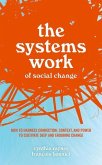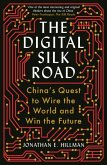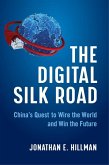Social Economy Science
Transforming the Economy and Making Society More Resilient
Herausgeber: Krlev, Gorgi; Bernhard, Marika; Pasi, Giulio; Wruk, Dominika
Social Economy Science
Transforming the Economy and Making Society More Resilient
Herausgeber: Krlev, Gorgi; Bernhard, Marika; Pasi, Giulio; Wruk, Dominika
- Gebundenes Buch
- Merkliste
- Auf die Merkliste
- Bewerten Bewerten
- Teilen
- Produkt teilen
- Produkterinnerung
- Produkterinnerung
This book provides the first comprehensive analysis of why and how social economy organizations create superior value for society. The chapters discuss the social economy's role in promoting innovation for impact, as well as its role as an agent of societal change and as a partner to businesses, governments, and citizens.
Andere Kunden interessierten sich auch für
![The Systems Work of Social Change The Systems Work of Social Change]() Cynthia Rayner (Senior Researcher, Senior Researcher, Graduate SchoThe Systems Work of Social Change47,99 €
Cynthia Rayner (Senior Researcher, Senior Researcher, Graduate SchoThe Systems Work of Social Change47,99 €![Building a Social Science Building a Social Science]() Kirsten MaddenBuilding a Social Science104,99 €
Kirsten MaddenBuilding a Social Science104,99 €![Virtue at Work Virtue at Work]() Geoff Moore (Professor of Business Et Professor of Business EthicsVirtue at Work92,99 €
Geoff Moore (Professor of Business Et Professor of Business EthicsVirtue at Work92,99 €![The Digital Silk Road The Digital Silk Road]() Jonathan E. HillmanThe Digital Silk Road27,99 €
Jonathan E. HillmanThe Digital Silk Road27,99 €![An Ugly Truth An Ugly Truth]() Sheera FrenkelAn Ugly Truth22,99 €
Sheera FrenkelAn Ugly Truth22,99 €![The Digital Silk Road The Digital Silk Road]() Jonathan E. HillmanThe Digital Silk Road38,99 €
Jonathan E. HillmanThe Digital Silk Road38,99 €![Think Like a Freak Think Like a Freak]() Steven D. LevittThink Like a Freak14,99 €
Steven D. LevittThink Like a Freak14,99 €-
-
-
This book provides the first comprehensive analysis of why and how social economy organizations create superior value for society. The chapters discuss the social economy's role in promoting innovation for impact, as well as its role as an agent of societal change and as a partner to businesses, governments, and citizens.
Hinweis: Dieser Artikel kann nur an eine deutsche Lieferadresse ausgeliefert werden.
Hinweis: Dieser Artikel kann nur an eine deutsche Lieferadresse ausgeliefert werden.
Produktdetails
- Produktdetails
- Verlag: Oxford University Press
- Seitenzahl: 496
- Erscheinungstermin: 28. Februar 2024
- Englisch
- Abmessung: 226mm x 163mm x 43mm
- Gewicht: 856g
- ISBN-13: 9780192868343
- ISBN-10: 0192868349
- Artikelnr.: 68472472
- Herstellerkennzeichnung
- Libri GmbH
- Europaallee 1
- 36244 Bad Hersfeld
- gpsr@libri.de
- Verlag: Oxford University Press
- Seitenzahl: 496
- Erscheinungstermin: 28. Februar 2024
- Englisch
- Abmessung: 226mm x 163mm x 43mm
- Gewicht: 856g
- ISBN-13: 9780192868343
- ISBN-10: 0192868349
- Artikelnr.: 68472472
- Herstellerkennzeichnung
- Libri GmbH
- Europaallee 1
- 36244 Bad Hersfeld
- gpsr@libri.de
Gorgi Krlev is Associate Professor of Sustainability at ESCP Business School in Paris. He also holds a Visiting Professorship at the Politecnico di Milano and a Visiting Fellow position at Kellogg College, University of Oxford. In his research he deals with social entrepreneurship, social innovations, and impact. His work has won numerous awards, including a best book award from the Academy of Management's Public and Nonprofit Division, the Roman Herzog Institute's 2021 Award for innovative contributions to the social market economy, and the International Society for Third Sector Research's 2022 policy impact award. Dominika Wruk is Assistant Professor for Sustainable Entrepreneurship at the University of Mannheim. She has been leading the platforms2share research group, focussed on platform cooperatives and funded by the German Ministry for Education and Research, for several years. She led the i-share project consortium, in which she was also responsible for analysing the social, ecological, and economic effects of the sharing economy. She has also held a position as a SCANCOR Visiting Researcher at Stanford University. Giulio Pasi is a member of the Advisory Board of the Bureau of Entrepreneurial Finance at the University of Turin and Professor of Economics at the Universidad Loyola in Seville. He has served as Scientific Officer at the European Commission Joint Research Centre, leading the work on social innovation, new financial engineering, and the relationships between public policy and new markets or industries, as well as the impact of digital transformation. He is the author of about 60 publications and is a globally recognized expert in the field of impact investing. He has been a keynote speaker at events organized by the OECD, the World Economic Forum, and the Global Steering Group on Impact Investing (former G8-taskforce). Marika Bernhard is Sustainability Lead at DFL (German Football League). She is also the founder and chairwoman of Social Entrepreneurship Baden-Württemberg (SocEnt BW), a network organization supporting impact driven ventures across Germany. She initiated the Social Innovation Summit, which after many years of running successfully as an entrepreneurial endeavour, merged existing efforts and partnerships, including with the European Commission, to become the Social Economy Science Conference in 2021.
* 1: Gorgi Krlev, Dominika Wruk, Giulio Pasi, and Marika Bernhard: Why
should we care about social economy science?
* 2: François Bonnici and Veerle Klijn: Public policies to advance the
social economy
* 3: Gorgi Krlev, Dominika Wruk, Giulio Pasi, and Marika Bernhard:
Social economy: Between common identity and accelerating social
change
* 4: Marieke Huysentruyt: The joint search for new approaches with a
public good benefit: Four strategies and the role of social economy
organizations
* 5: Geoff Mulgan: The social economy and the Fourth Industrial
Revolution: The risks of marginalization and how to avoid them
* 6: Alex Nicholls and Jarrod Ormiston: Financial market
transformations for investing in social impact
* 7: Lisa Hehenberger and Leonora Buckland: How impact measurement
fosters the social economy: From measurement to impact of learning
and management for impact
* 8: Julie Battilana, Leszek Krol, Alexandra Ubalijoro, and Kara
Sheppard-Jones: Beyond a niche approach: Could social business become
the norm?
* 9: Rocío Nogales-Muriel and Marthe Nyssens: Empowering knowledge and
training in higher education as a lever for social economy ecosystems
* 10: Rafael Chaves-Avila and Angel Soler-Guillem: Social economy
resilience facing the Covid-19 crisis: Facts and prospects
* 11: Ruth Brännvall: How social innovation practices of the social
economy promote development in Africa
* 12: Mario Calderini, Veronica Chiodo, Francesco Gerli, and Giulio
Pasi: The centrality of social-tech entrepreneurship in an inclusive
growth agenda
* 13: Anne-Karen Hueske, Willemine Willems, and Kai Hockerts: Why and
how to engage beneficiaries as co-(social) entrepreneurs? Considering
hardware, software, and orgware for citizen engagement
* 14: Alessandro Sancino, Michela Pagani, Luigi Corvo, Alessandro
Braga, and Fulvio Scognamiglio: Civic leadership for a transformative
social economy: A comparison of city leadership constellations in
Italy and the UK
* 15: António Miguel: Public structural funds as a catalyst for social
innovation: The experience of Portugal Social Innovation
* 16: Eva Varga and Malcolm Hayday: Social procurement to promote
social problem solving
* 17: Eleanor Carter and Nigel Ball: Social outcomes contracting:
Seeing a more relational approach to contracts between government and
the social economy?
* 18: Gorgi Krlev, Dominika Wruk, Giulio Pasi, and Marika Bernhard:
Conclusions
should we care about social economy science?
* 2: François Bonnici and Veerle Klijn: Public policies to advance the
social economy
* 3: Gorgi Krlev, Dominika Wruk, Giulio Pasi, and Marika Bernhard:
Social economy: Between common identity and accelerating social
change
* 4: Marieke Huysentruyt: The joint search for new approaches with a
public good benefit: Four strategies and the role of social economy
organizations
* 5: Geoff Mulgan: The social economy and the Fourth Industrial
Revolution: The risks of marginalization and how to avoid them
* 6: Alex Nicholls and Jarrod Ormiston: Financial market
transformations for investing in social impact
* 7: Lisa Hehenberger and Leonora Buckland: How impact measurement
fosters the social economy: From measurement to impact of learning
and management for impact
* 8: Julie Battilana, Leszek Krol, Alexandra Ubalijoro, and Kara
Sheppard-Jones: Beyond a niche approach: Could social business become
the norm?
* 9: Rocío Nogales-Muriel and Marthe Nyssens: Empowering knowledge and
training in higher education as a lever for social economy ecosystems
* 10: Rafael Chaves-Avila and Angel Soler-Guillem: Social economy
resilience facing the Covid-19 crisis: Facts and prospects
* 11: Ruth Brännvall: How social innovation practices of the social
economy promote development in Africa
* 12: Mario Calderini, Veronica Chiodo, Francesco Gerli, and Giulio
Pasi: The centrality of social-tech entrepreneurship in an inclusive
growth agenda
* 13: Anne-Karen Hueske, Willemine Willems, and Kai Hockerts: Why and
how to engage beneficiaries as co-(social) entrepreneurs? Considering
hardware, software, and orgware for citizen engagement
* 14: Alessandro Sancino, Michela Pagani, Luigi Corvo, Alessandro
Braga, and Fulvio Scognamiglio: Civic leadership for a transformative
social economy: A comparison of city leadership constellations in
Italy and the UK
* 15: António Miguel: Public structural funds as a catalyst for social
innovation: The experience of Portugal Social Innovation
* 16: Eva Varga and Malcolm Hayday: Social procurement to promote
social problem solving
* 17: Eleanor Carter and Nigel Ball: Social outcomes contracting:
Seeing a more relational approach to contracts between government and
the social economy?
* 18: Gorgi Krlev, Dominika Wruk, Giulio Pasi, and Marika Bernhard:
Conclusions
* 1: Gorgi Krlev, Dominika Wruk, Giulio Pasi, and Marika Bernhard: Why
should we care about social economy science?
* 2: François Bonnici and Veerle Klijn: Public policies to advance the
social economy
* 3: Gorgi Krlev, Dominika Wruk, Giulio Pasi, and Marika Bernhard:
Social economy: Between common identity and accelerating social
change
* 4: Marieke Huysentruyt: The joint search for new approaches with a
public good benefit: Four strategies and the role of social economy
organizations
* 5: Geoff Mulgan: The social economy and the Fourth Industrial
Revolution: The risks of marginalization and how to avoid them
* 6: Alex Nicholls and Jarrod Ormiston: Financial market
transformations for investing in social impact
* 7: Lisa Hehenberger and Leonora Buckland: How impact measurement
fosters the social economy: From measurement to impact of learning
and management for impact
* 8: Julie Battilana, Leszek Krol, Alexandra Ubalijoro, and Kara
Sheppard-Jones: Beyond a niche approach: Could social business become
the norm?
* 9: Rocío Nogales-Muriel and Marthe Nyssens: Empowering knowledge and
training in higher education as a lever for social economy ecosystems
* 10: Rafael Chaves-Avila and Angel Soler-Guillem: Social economy
resilience facing the Covid-19 crisis: Facts and prospects
* 11: Ruth Brännvall: How social innovation practices of the social
economy promote development in Africa
* 12: Mario Calderini, Veronica Chiodo, Francesco Gerli, and Giulio
Pasi: The centrality of social-tech entrepreneurship in an inclusive
growth agenda
* 13: Anne-Karen Hueske, Willemine Willems, and Kai Hockerts: Why and
how to engage beneficiaries as co-(social) entrepreneurs? Considering
hardware, software, and orgware for citizen engagement
* 14: Alessandro Sancino, Michela Pagani, Luigi Corvo, Alessandro
Braga, and Fulvio Scognamiglio: Civic leadership for a transformative
social economy: A comparison of city leadership constellations in
Italy and the UK
* 15: António Miguel: Public structural funds as a catalyst for social
innovation: The experience of Portugal Social Innovation
* 16: Eva Varga and Malcolm Hayday: Social procurement to promote
social problem solving
* 17: Eleanor Carter and Nigel Ball: Social outcomes contracting:
Seeing a more relational approach to contracts between government and
the social economy?
* 18: Gorgi Krlev, Dominika Wruk, Giulio Pasi, and Marika Bernhard:
Conclusions
should we care about social economy science?
* 2: François Bonnici and Veerle Klijn: Public policies to advance the
social economy
* 3: Gorgi Krlev, Dominika Wruk, Giulio Pasi, and Marika Bernhard:
Social economy: Between common identity and accelerating social
change
* 4: Marieke Huysentruyt: The joint search for new approaches with a
public good benefit: Four strategies and the role of social economy
organizations
* 5: Geoff Mulgan: The social economy and the Fourth Industrial
Revolution: The risks of marginalization and how to avoid them
* 6: Alex Nicholls and Jarrod Ormiston: Financial market
transformations for investing in social impact
* 7: Lisa Hehenberger and Leonora Buckland: How impact measurement
fosters the social economy: From measurement to impact of learning
and management for impact
* 8: Julie Battilana, Leszek Krol, Alexandra Ubalijoro, and Kara
Sheppard-Jones: Beyond a niche approach: Could social business become
the norm?
* 9: Rocío Nogales-Muriel and Marthe Nyssens: Empowering knowledge and
training in higher education as a lever for social economy ecosystems
* 10: Rafael Chaves-Avila and Angel Soler-Guillem: Social economy
resilience facing the Covid-19 crisis: Facts and prospects
* 11: Ruth Brännvall: How social innovation practices of the social
economy promote development in Africa
* 12: Mario Calderini, Veronica Chiodo, Francesco Gerli, and Giulio
Pasi: The centrality of social-tech entrepreneurship in an inclusive
growth agenda
* 13: Anne-Karen Hueske, Willemine Willems, and Kai Hockerts: Why and
how to engage beneficiaries as co-(social) entrepreneurs? Considering
hardware, software, and orgware for citizen engagement
* 14: Alessandro Sancino, Michela Pagani, Luigi Corvo, Alessandro
Braga, and Fulvio Scognamiglio: Civic leadership for a transformative
social economy: A comparison of city leadership constellations in
Italy and the UK
* 15: António Miguel: Public structural funds as a catalyst for social
innovation: The experience of Portugal Social Innovation
* 16: Eva Varga and Malcolm Hayday: Social procurement to promote
social problem solving
* 17: Eleanor Carter and Nigel Ball: Social outcomes contracting:
Seeing a more relational approach to contracts between government and
the social economy?
* 18: Gorgi Krlev, Dominika Wruk, Giulio Pasi, and Marika Bernhard:
Conclusions








